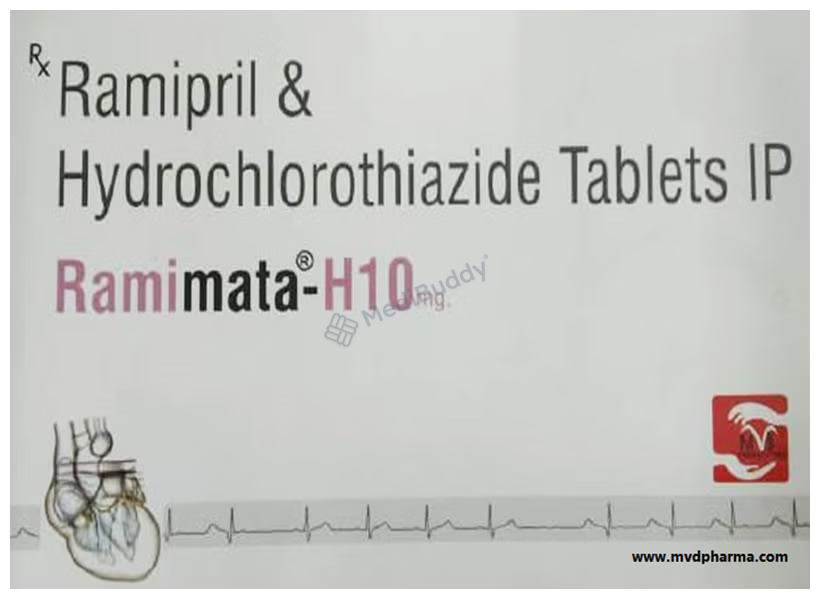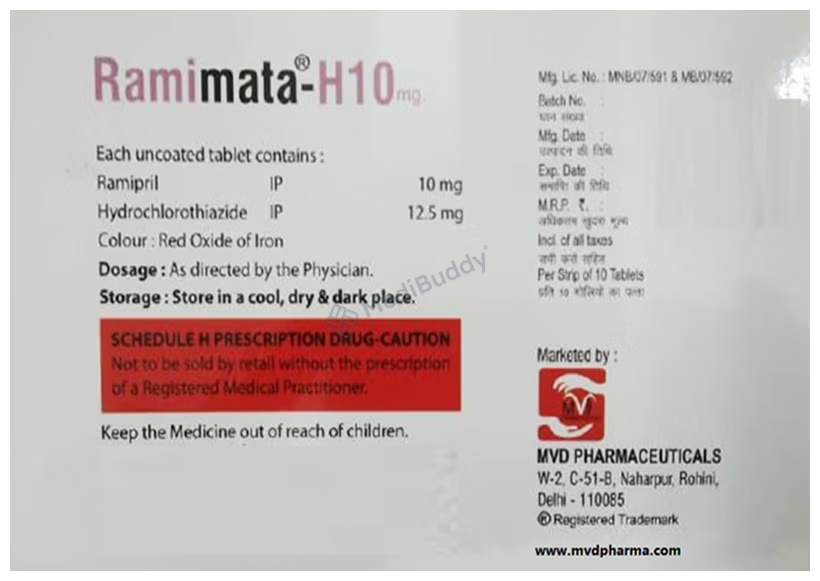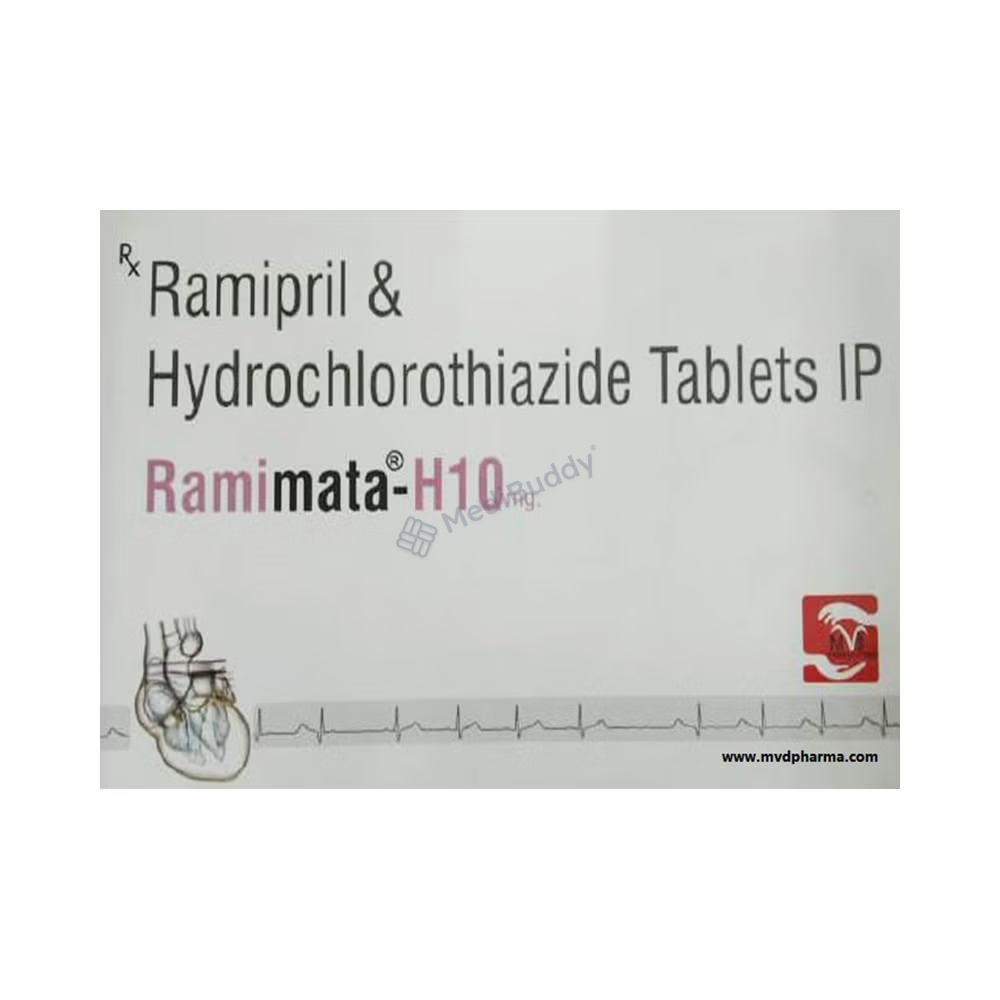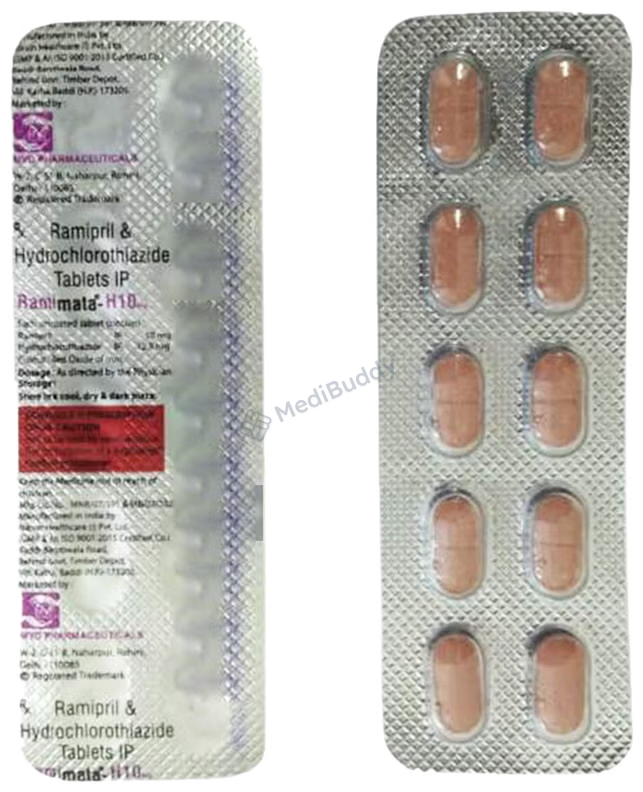Ramimata H 10mg/12.5mg Tablet
By Ramimata H
Rx
10 Tablet in a Strip

Composition
Ramipril(10mg) + Hydrochlorothiazide(12.5mg)

Manufacturer - MVD Pharmaceuticals Pvt Ltd
Unit No.217, 47355/22, Prakash Deep Building New Delhi

Expires on or after
May, 2026
About Ramimata H 10mg/12.5mg Tablet
Ramimata H 10mg/12.5mg Tablet is a medication designed to address hypertension, commonly known as high blood pressure. This tablet is a unique combination of two powerful medicines that work together to regulate blood pressure more effectively than a single medication alone. Managing hypertension is crucial as it can reduce the likelihood of future heart attacks and strokes.
When using Ramimata H 10mg/12.5mg Tablet, it is advised to take it with or without food, preferably in the morning to minimize the need for nighttime urination. It is crucial to adhere to the dosage recommended by your healthcare provider. Even if you are feeling well, it is important not to discontinue this medication without consulting your doctor, as high blood pressure often presents no noticeable symptoms. Discontinuing the medication without guidance can lead to a worsening of your condition.
Alongside medication, maintaining an active lifestyle with regular exercise, managing weight, and consuming a balanced diet can significantly contribute to controlling blood pressure levels. It is essential to heed your doctor's instructions while using this medicine for optimal results.
Some common side effects of Ramimata H 10mg/12.5mg Tablet include nausea, indigestion, changes in taste, and diarrhea. If any of these side effects become bothersome or persistent, it is advisable to seek guidance from your doctor. Additionally, persistent cough or throat irritation should be reported to your healthcare provider. Staying well-hydrated can help alleviate muscle weakness, dry mouth, and extreme thirst. While dizziness may occur due to low blood pressure, it typically improves over time.
Prior to initiating treatment with Ramimata H 10mg/12.5mg Tablet, it is essential to inform your doctor about any existing liver or kidney issues. Pregnant or breastfeeding individuals should seek medical advice before using this medication. Disclose all other medications, particularly those aimed at managing high blood pressure or heart conditions, to your doctor. Regular monitoring of blood pressure, kidney function, and electrolyte levels such as potassium is necessary to ensure the medication is effectively controlling hypertension.
Benefits
Ramimata H 10mg/12.5mg Tablet offers numerous benefits, especially in treating hypertension (high blood pressure). By relaxing the blood vessels, this medication allows blood to flow more smoothly throughout your body. Additionally, it helps in eliminating excess water from the body, which in turn increases urine output. These actions collectively result in lowering blood pressure levels, subsequently reducing the risks associated with conditions like stroke, heart attack, and kidney problems in the future. While the effects may not be immediately felt, consistent use of Ramimata H 10mg/12.5mg Tablet over time plays a crucial role in maintaining overall well-being. It is vital to adhere to the prescribed dosage for optimal effectiveness, even if you start to feel better. By following the recommended regimen, Ramimata H 10mg/12.5mg Tablet can effectively contribute to improved health outcomes and better management of hypertension.
How to use the Ramimata H 10mg/12.5mg Tablet
To use Ramimata H 10mg/12.5mg Tablet, follow the instructions given by your doctor. The recommended dose and duration should be strictly followed. The tablet should be swallowed whole and should not be chewed, crushed, or broken. You can take Ramimata H 10mg/12.5mg Tablet with or without food, but it is preferable to take it at the same time each day for better results. Be sure to consult your doctor for the appropriate usage of this medication to ensure its effectiveness and safety.
Uses of Ramimata H 10mg/12.5mg Tablet
Ramimata H 10mg/12.5mg Tablet is primarily used to treat hypertension, which is characterized by high blood pressure. This medication helps to effectively lower high blood pressure to reduce the risk of serious health complications associated with hypertension. By regulating blood pressure levels, Ramimata H 10mg/12.5mg Tablet can help maintain overall cardiovascular health. This tablet is an essential part of managing hypertension and should be taken as prescribed by a healthcare provider to achieve optimal results.
What conditions Ramimata H 10mg/12.5mg Tablet treats?
Ramimata H 10mg/12.5mg Tablet is used for treating hypertension, also known as high blood pressure. Hypertension is a condition where the force of blood against the walls of your blood vessels is consistently too high. This medication helps to lower blood pressure by relaxing blood vessels, reducing excess water, and increasing urine output. By controlling high blood pressure, Ramimata H 10mg/12.5mg Tablet decreases the risk of serious complications like heart attacks, strokes, and kidney issues in the future. Following your doctor's advice on how to take this medication is essential for its effectiveness, even if you don't notice immediate changes in how you feel.
Should you consult a doctor?
If you experience persistent side effects such as nausea, indigestion, taste changes, diarrhea, stomach pain, headache, dizziness, weakness, glucose intolerance, increased uric acid or blood lipid levels, electrolyte imbalance, cough, decreased blood pressure, tickling, nutritional disorders, worsening diabetes, hypotension (low blood pressure), or any symptoms that concern you, it is essential to consult your doctor promptly. Additionally, if you have liver or kidney issues, are pregnant or breastfeeding, or take other medications for hypertension or heart conditions, seek medical advice before starting Ramimata H 10mg/12.5mg Tablet. Regular monitoring of blood pressure, kidney function, and electrolyte levels is crucial to ensure the medicine is effective and safe for you. Remember not to discontinue the medication without consulting your doctor, even if you feel well, as stopping it abruptly can worsen your condition. Be proactive in maintaining a healthy lifestyle through regular exercise and a balanced diet while following your healthcare provider’s guidance during the treatment.
Side effects of Ramimata H 10mg/12.5mg Tablet
When taking Ramimata H 10mg/12.5mg Tablet, some common side effects may occur while your body gets used to the medication. These side effects include nausea, indigestion, taste changes, diarrhea, stomach pain, headache, dizziness, and weakness. Some people might also experience glucose intolerance, increased uric acid level in the blood, increased blood lipid level, electrolyte imbalance, cough, decreased blood pressure, and a tickling sensation. In rare cases, there may be a risk of nutritional disorders, worsening of diabetes, and hypotension (low blood pressure). Most of these side effects are mild and tend to go away on their own as you continue to take the medication. However, if any side effects persist or you are concerned about them, it is important to consult your doctor for further guidance.
Safety advice

liver
When taking Ramimata H 10mg/12.5mg Tablet, it is important to be cautious if you have liver disease. In such cases, your doctor may need to adjust the dosage of the medication. Therefore, it is recommended to consult your doctor for proper guidance before using Ramimata H 10mg/12.5mg Tablet.

kidney
Caution should be taken when using Ramimata H 10mg/12.5mg Tablet in patients with kidney disease. Dose adjustment may be necessary, so consult your doctor. Regular blood pressure monitoring is advised for dose adjustments.

alcohol
When taking Ramimata H 10mg/12.5mg Tablet, be cautious about consuming alcohol as it can increase drowsiness.

driving
When taking Ramimata H 10mg/12.5mg Tablet, be cautious and avoid driving if you experience decreased alertness, vision problems, drowsiness, or dizziness. These symptoms may affect your ability to drive safely.

pregnancy
Ramimata H 10mg/12.5mg Tablet is not safe during pregnancy due to the risk to the developing baby. However, in life-threatening situations, a doctor may prescribe it if benefits outweigh risks. Consult your doctor.

breastfeeding
Ramimata H 10mg/12.5mg Tablet is considered safe to use while breastfeeding based on limited human data showing no significant risks to the baby.
Consumption warning before consuming Ramimata H 10mg/12.5mg Tablet
Before consuming Ramimata H 10mg/12.5mg Tablet, used for treating hypertension, remember to take it as prescribed even if feeling well, as stopping may worsen conditions. This medicine, a combination for blood pressure control, reduces risks of heart attack and stroke. It's advisable to take it in the morning with or without food, to help avoid night-time urination. While on this medication, maintain an active lifestyle with exercise, weight management, and a healthy diet as per your doctor's guidance.
Be aware that common side effects like nausea, indigestion, taste changes, or diarrhea may occur. If these persist or worsen, consult your doctor. Continuous cough or throat irritation should also be reported. To combat muscle weakness, dry mouth, or extreme thirst, increase fluid intake. Dizziness due to low blood pressure is a possible initial side effect.
Inform your doctor about any liver or kidney issues, pregnancy, or breastfeeding before starting this medication. Regularly monitor blood pressure, kidney function, and electrolyte levels during treatment. Additionally, disclose any other medications being taken, especially those targeting hypertension or heart conditions, to avoid possible drug interactions.
What if you forgot to take Ramimata H 10mg/12.5mg Tablet?
If you happen to forget to take a dose of Ramimata H 10mg/12.5mg Tablet, make sure to take it as soon as you remember. But, if it's getting close to the time for your next scheduled dose, it's best to just skip the missed dose and continue with your regular dosing schedule. It's important not to take a double dose to make up for the missed one as this can lead to unwanted side effects. Remember, always follow your prescribed dosing instructions carefully to ensure the best results from your medication.
Related lab tests
For individuals taking Ramimata H 10mg/12.5mg Tablet, it is important to monitor their kidney function regularly through specific lab tests. One of the key tests to consider is the Kidney Function Test. This test helps in assessing how well the kidneys are functioning by measuring different markers such as creatinine, blood urea nitrogen (BUN), and estimated glomerular filtration rate (eGFR). These markers provide valuable information about the overall health of the kidneys and can help in detecting any potential issues at an early stage. Additionally, tests such as Urinalysis and Serum Electrolytes may also be beneficial in monitoring kidney function while taking Ramimata H 10mg/12.5mg Tablet. Regularly monitoring these lab tests can aid in ensuring the proper functioning of the kidneys and maintaining overall health.
Additional Information
| Habit Forming | No |
| Chemical Class | - |
| Therapeutic Class | - |
| Action Class | - |
FAQs
Disclaimer
The information provided on this website is to the best of our abilities to ensure it is accurate, reliable, and reviewed by a team of professionals. It should not be used to diagnose, prevent, or cure any health problem. The information presented here is not intended to create a doctor-patient relationship or replace a registered medical practitioner's advice, diagnosis, or treatment. The absence or provision of any information or warning regarding any medicine should not be assumed as an implied or explicit assurance of safety or efficacy. We highly recommend consulting your registered medical practitioner for all queries or doubts related to your medical condition. Do not ignore professional medical advice or delay seeking it based on the content encountered on our website. We intend to support, not replace, the doctor-patient relationship.
₹144
₹160
10% OFF
Inclusive of all taxes
Content verified by

Dr. Mansi Chaudhari
MBBS - General Medicine
Last update on 01-Oct-2024



